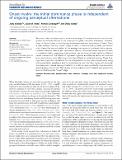Onset Rivalry: The Initial Dominance Phase Is Independent Of Ongoing Perceptual Alternations
Citation
Stanley, Jody, Jason D. Forte, Patrick Cavanagh, and Olivia Carter. 2011. Onset rivalry: The initial dominance phase is independent of ongoing perceptual alternations. Frontiers in Human Neuroscience 5:140.Abstract
Binocular rivalry has been used to study a wide range of visual processes, from the integration of low-level features to the selection of signals that reach awareness. However, many of these studies do not distinguish between early and late phases of rivalry. There is clear evidence that the “onset” stage of rivalry is characterized by stable, yet idiosyncratic biases that are not evident in the average dominance of sustained rivalry viewing. Low-level stimulus features also have robust effects in the onset phase that are not seen in sustained rivalry, suggesting these phases may be driven at least partly by different neural mechanisms. The effects of high-level cognitive and affective factors at onset are less clear but also show differences from their effects in sustained viewing. These findings have important implications for the interpretation of any rivalry experiments using brief presentation paradigms and for understanding how the brain copes with binocular discrepancies in natural viewing conditions in which our eyes constantly move around an ever-changing environment. This review will summarize current research and explore the factors influencing this “onset” stage.Other Sources
http://www.ncbi.nlm.nih.gov/pmc/articles/PMC3258971/pdf/Terms of Use
This article is made available under the terms and conditions applicable to Other Posted Material, as set forth at http://nrs.harvard.edu/urn-3:HUL.InstRepos:dash.current.terms-of-use#LAACitable link to this page
http://nrs.harvard.edu/urn-3:HUL.InstRepos:10354435
Collections
- FAS Scholarly Articles [18258]
Contact administrator regarding this item (to report mistakes or request changes)



